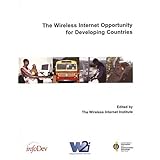
Average Reviews:

(More customer reviews)The United Nations believes that the wireless Internet may give developing countries an affordable and practical boost to their economies. The book goes into many reasons why this should be so. It suggests that unlike the vast majority of technical innovations, which trickle down slowly from the developed countries, the wireless Internet's uptake may actually be comparable or even faster in some of the latter than in the former.
Cell phones are the main example. While it might be objected that these do not typically use the Internet Protocol, with time that difference will disappear. Take the rise of Voice Over IP as the prime example. The book makes the cogent point that cell phones in a developing country are attractive because they can be deployed almost immediately. Whereas landlines might well take a year (or more) to install. And these necessitate a much greater physical buildout, which explains part of that delay.
Plus, cell phones can be used quickly as a vital means for farmers and others to gain access to information. Where previously this might have been the monopoly of middlemen. Thus, there could be a quick boost to productivity and income in low-income groups.
The book also suggests that the mass uptake of these wireless gadgets may lead to innovations rising out of the developing countries. Certainly, the potential sheer size might give them leverage in terms of having devices made that are affordable to them.
Very promising future.
Click Here to see more reviews about: Wireless Internet Opportunity for Developing Countries (Ict Task Force Series)
This publication examines the potential of proven and inexpensive technologies to bridge the connectivity gap, which is one of the key factors of the digital divide. Key issues that need the attention of governments, international development agencies, and NGOs are clarified. Also covered are the opinions of leaders from the fields of social and economic development, information and communication technology, government, and international regulatory standards.

0 comments:
Post a Comment